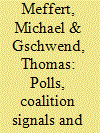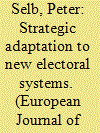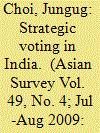| Srl | Item |
| 1 |
ID:
162423


|
|
|
|
|
| Summary/Abstract |
How does polling information, the polling source, and how it is presented influence strategic voting? Few studies capture at what point individuals become strategic voters or how polling information affects this behavior. Furthermore, strategic voting research in mixed member systems remains largely confined to aggregate district level analyses. This analysis employs an experimental survey implemented in South Korea, Taiwan, and Japan. The results suggest that reminding respondents of the margin of error encourages strategic behavior, while polls originating from partisan sources discourage defection.
|
|
|
|
|
|
|
|
|
|
|
|
|
|
|
|
| 2 |
ID:
105706


|
|
|
|
|
| Publication |
2011.
|
| Summary/Abstract |
Polls and coalition signals can help strategic voters in multiparty systems with proportional representation and coalition governments to optimise their vote decision. Using a laboratory experiment embedded in two real election campaigns, this study focuses on voters' attention to and perception of polls and coalition signals. The manipulation of polls and coalition signals allows a causal test of their influence on strategic voting in a realistic environment. The findings suggest that active information acquisition to form fairly accurate perceptions of election outcomes can compensate for the advantage of high political sophistication. The theory of strategic voting is supported by the evidence, but only for a small number of voters. Most insincere vote decisions are explained by other factors. Thus, the common practice to consider all insincere voters as strategic is misleading.
|
|
|
|
|
|
|
|
|
|
|
|
|
|
|
|
| 3 |
ID:
113305


|
|
|
|
|
| Publication |
2012.
|
| Summary/Abstract |
How quickly, to what extent and under what conditions do voters and elites adapt to new electoral institutions in order to not waste their votes and effort on hopeless competitors? A latent-curve model of strategic adaptation is developed and fitted to district-level election data from Spain. The extent of strategic adaptation is generally found to vary with the strength of the electoral system. However, grave ethnic tensions are demonstrated to seriously retard adaptation even under favourable institutional conditions.
|
|
|
|
|
|
|
|
|
|
|
|
|
|
|
|
| 4 |
ID:
111904


|
|
|
|
|
| Publication |
2012.
|
| Summary/Abstract |
The extent of strategic voting in the Spanish general elections of 2000, 2004 and 2008 is estimated using a new measure of strategic incentives suitable for proportional representation systems that avoids some of the problems associated with lagged variables. Strategic behaviour increased from 12 to 33 per cent of the electoral base of the United Left Party, the major victim of strategic defection. This estimate is a conservative one as elite mobilisation is controlled for in the constituencies, which is unusual in the literature on strategic voting that uses regression-based methods.
|
|
|
|
|
|
|
|
|
|
|
|
|
|
|
|
| 5 |
ID:
140220


|
|
|
|
|
| Summary/Abstract |
What motivates people to vote strategically? Although a broad literature addresses this question, few studies capture the point at which individuals shift from sincere to strategic voters. Furthermore, the influence of polling information remains debated. The analysis in this article tackles strategic voting with an original embedded experiment in a web survey. Empirical analysis finds that respondents who were told of the margin of error in preelection polls were more likely to vote strategically. This analysis also suggests the limits to strategic voting even in ideal settings.
|
|
|
|
|
|
|
|
|
|
|
|
|
|
|
|
| 6 |
ID:
091098


|
|
|
|
|
| Publication |
2009.
|
| Summary/Abstract |
This study explores the issue of "strategic voting" in India by using individual-level, nationwide survey data from the 2004 general election. It finds that Indian voters are more "strategic" than "expressive" if their preferred party is unlikely to win a given parliamentary seat. Furthermore, the variables of being Muslim and education are found not to be statistically significant determinants of strategic voting.
|
|
|
|
|
|
|
|
|
|
|
|
|
|
|
|
| 7 |
ID:
133021


|
|
|
|
|
| Publication |
2014.
|
| Summary/Abstract |
This article studies the consequences of strategic voting by outcome-oriented voters in elections under proportional representation (PR). I develop a model of elections under PR, in which voters choose among an arbitrary finite number of parties, and the policy outcome is determined in a postelection bargaining stage. I use a new solution concept, robust equilibrium, which greatly mitigates the well-known problem of indeterminate predictions in multicandidate competition. Applying the equilibrium concept to the model, I find that PR promotes representation of small parties in general, even when voters are strategic. However, the median voter plays a critical role in shaping policy outcomes, which reflects the majoritarian nature of parliamentary policy making rules. Thus, PR may not be incompatible with the majoritarian vision of representative democracy if voters' main concern is policy outcomes.
|
|
|
|
|
|
|
|
|
|
|
|
|
|
|
|
| 8 |
ID:
172537


|
|
|
|
|
| Summary/Abstract |
Strategic voting is an important explanation for aggregate political phenomena, but we know little about how strategic voting varies across types of voters. Are richer voters more strategic than poorer voters? Does strategic behavior vary with age, education, gender, or political leaning? The answers may be important for assessing how well an electoral system represents different preferences in society. We introduce a new approach to measuring and comparing strategic voting across voters that can be broadly applied, given appropriate survey data. In recent British elections, we find that older voters vote more strategically than younger voters and that richer voters vote more strategically than poorer voters, even as strategic behavior varies little across the education level. The differences in strategic voting by age and income are smaller than observed differences in turnout by age and income, but they tend to exacerbate these better-known inequalities in political participation.
|
|
|
|
|
|
|
|
|
|
|
|
|
|
|
|